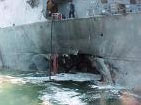|
|
|
UK resident released from Guantanamo
International |
2007/04/01 18:18
|
| British resident and Iraqi citizen Bisher al-Rawi was released this weekend from the US military prison at Guantanamo Bay after nearly five years in custody as an enemy combatant. Officials have not confirmed the exact time of al-Rawi's release, but he issued a statement Sunday from his family's home in London. Al-Rawi expressed his happiness to be free and described his "nightmare" at Guantanamo: "Allegations are made against you that are laughably untrue, but you have no chance to prove them wrong. There is no trial, no fair legal process." Al-Rawi was also regretful that his "best friend" Jamil al-Banna remains imprisoned at Guantanamo. Al-Rawi and al-Banna, also a UK resident, were originally suspected of ties to al Qaeda because of their alleged connection with radical Muslim cleric Abu Qatada. The men were arrested returning to the UK from Gambia with a suspicious electronic device, which they claimed was a battery charger, and were taken into US custody. Despite a general refusal to represent resident aliens at Guantanamo, the British government agreed to help secure al Rawi's release last year after learning that al-Rawi had previously aided British security service MI5. UK Foreign Secretary Margaret Beckett announced al-Rawi's impending release last Thursday; no official comments have been made regarding al-Banna's status. |
|
|
|
|
|
|
A Little April Fool's fun from Google
Venture Business News |
2007/04/01 15:21
|
| Google continues its string of technical innovations. On April 1st, to celebrate the ~500th April Fool's Day, they launched a new service: Google TiSP (Toilet Internet Service Provider) BETA. The new internet service, codenamed "Dark porcelain," delivers online connectivity via users' plumbing systems. "We've got that whole organizing-the-world's-information thing more or less under control," said Google Co-founder and President Larry Page, a longtime supporter of so-called "dark porcelain" research and development. "What's interesting, though, is how many different modalities there are for actually getting that information to you - not to mention from you." "I couldn't be more excited about, and am only slightly grossed out by, this remarkable new product," said Marissa Mayer, Google's Vice President of Search Products and User Experience. "I firmly believe TiSP will be a breakthrough product, particularly for those users who, like Larry himself, do much of their best thinking in the bathroom." As you figured it out, unfortunately it's only an April Fool's joke from Google. However, we can't help but fantasize about this great service: Google has successfully devised a "last hundred smelly yards" solution that takes advantage of preexisting plumbing and sewage systems and their related hydraulic data-transmission capabilities. "There's actually a thriving little underground community that's been studying this exact solution for a long time," says Page. "And today our Toilet ISP team is pleased to be leading the way through the sewers, up out of your toilet and - splat - right onto your PC." They also have posted do-it-yourself instructions on how to get it started right now: http://www.google.com/tisp/install.html It only takes 8 easy steps to get online at full speed, using the do-it-yourself package, or you can have a professional come in and hook up your toilet to the network. For your own physical safety and emotional well-being and in consideration of the nanobots' working conditions, please make absolutely certain that your toilet is unoccupied at the scheduled appointment time, Google warns. Google has also announced it is actively developing a higher-performance version of TiSP specifically tailored to small and medium-sized businesses, including 24-hour, on-site technical support in the event of backup problems, brownouts and data wipes. The Toilet Internet Service Provider (TiSP) project is a self-installed, ad-supported online service that will be offered entirely free to any consumer with a WiFi-capable PC and a toilet connected to a local municipal sewage system. TiSP is available today only in the U.S. and Canada. Google announced it has formed an international consortium of utility companies, sewage system experts, toilet manufacturers, and plumbers to develop solutions to the many problems facing all "dark porcelain"-based data-delivery innovators. Why still in BETA phase? "When things go wrong with TiSP, they go very, very wrong. Let's leave it at that," Google answers. So, rush out and order this April Fool's Day special from Google. It's such a great offer, it might not be available until the next Fool's Day. |
|
|
|
|
|
|
Israeli Leader To Face Second Rape Count
International |
2007/04/01 10:24
|
Israeli Attorney General Meni Mazuz notified lawyers for Israeli President Moshe Katsav that a second rape charge may be added to Katsav's indictment for alleged sex crimes. The additional charges were made by the same woman who originally accused Katsav of sexual assault, fraud, and rape but it has not been made clear why these allegations have only recently emerged. Katsav, who has been on a leave of absence from his largely ceremonial post since January, was interrogated by police for more than two hours last week about the most recent charges. Despite pleas for resignationfrom legal commentators and Prime Minister Ehud Olmert, Katsav has refused to considering resignation. All Israeli senior state officials have the right to a hearing before the attorney general before an indictment is formally filed. Katsav's hearing is tentatively scheduled for May 2. Katsav currently has immunity, but can be impeached or prosecuted after he leaves office at the end of this term this year. |
|
|
|
|
|
|
Hick's father says plea deal proves case corruption
Breaking Legal News |
2007/04/01 10:23
|
| Guantanamo inmate David Hicks, gagged from speaking to the media, will soon return to Australia from Cuba under a plea deal that reflects the weakness of the prosecution case and political needs of a close US ally, his father said today. "The military commission system is transparent all right – transparently corrupt," Terry Hicks said, exuberant about the leniency of his son's sentence but still furious about the treatment the 31-year-old Muslim convert has endured for five years. David Hicks will serve a nine-month sentence in a prison in his hometown of Adelaide after admitting last week that he aided al-Qaida in a plea deal at the US naval base at Guantanamo Bay. The deal prevents him from talking to the media for 12 months or pursuing his allegations of abuse while in US custody. Legal observers and opposition lawmakers have joined Terry Hicks in saying the deal is tailored to remove potential political embarrassment for Australian Prime Minister John Howard, who will seek his fifth three-year term as national leader at elections due later this year. |
|
|
|
|
|
|
Judge tosses out rules for managing forests
Law Center |
2007/04/01 10:19
|
| A federal district judge in San Francisco has ruled that the US Forest Service violated environmental laws when it promulgated a 2005 regulation governing the management of national forests. On motions for summary judgment in combined lawsuits brought by environmental groups, US District Judge Phyllis Hamilton of the Northern District of California Friday enjoined the Forest Service from enforcing the rule "until it has fully complied" with the Endangered Species Act and the National Environmental Policy Act. Hamilton found that the 2005 regulation, which gave national forest managers more discretion in allowing logging, mining and other activities, had been adopted without adequate procedural safeguards, environmental reviews and public comment. Hamilton wrote: The agency was required to undertake some type of consultation, informal or otherwise, prior to making a conclusive determination that there would be no effect. Given the 2005 Rule's potential indirect effects on listed species, combined with the USDA's lack of documentation in support of their "no effect" determination, the failure to consult and/or prepare any type of biological analysis in conjunction with the 2005 Rule was arbitrary and capricious. At the same time, Hamilton declined to reinstate a 1982 regulation, as the environmental groups had sought. Rodger Schlickeisen, president of Defenders of Wildlife, one of the plaintiff groups, praised Hamilton's ruling, saying:
The Bush administration reversed decades of progress in managing national forests, without considering the impacts on wildlife and the environment. The administration also cut the public out of the loop when considering these large-scale changes to how our nation's forests are managed.
US Justice Department officials are considering an appeal. |
|
|
|
|
|
|
Microsoft confirms new Xbox 360 with HDMI
Venture Business News |
2007/04/01 10:18
|
| It's been one of the worst-kept video game secrets of the past month, and this week Microsoft finally confirmed the rumours swirling around the Internet to be true: a new Xbox 360 model is on the way. Dubbed the Xbox 360 Elite, the third version of the game console will be jet black in colour, boast a 120 GB hard drive (versus the standard Xbox 360's 20 GB drive) and have an HDMI output jack and cable, allowing it to take advantage of the highest resolution available on current high-definition TVs. But the impending arrival of the Xbox 360 Elite hasn't been met with universal praise, even from among some of the Xbox faithful on Internet forums. Some fans are pointing out that the Elite is the same price as the entry level PlayStation 3 model, but lacks the PS3's built-in high-definition, high-capacity Blu-ray disc drive. Others are bitter that they recently bought an Xbox 360 without having any inkling that a better model of the game console was on the way for just $50 more. The Xbox 360 Elite's controller and headset will also be black in color, and black versions of most Xbox 360 accessories will be available in stores when the new console goes on sale. For those who want to upgrade their current Xbox 360, the 120 GB hard drive will be sold separately for $209, but existing Xbox 360s will not have an option of being upgraded to support HDMI output. |
|
|
|
|
|
|
USS Cole suspect claims torture led to confession
Breaking Legal News |
2007/04/01 10:17
|
| Abd al-Rahim al-Nashiri, the suspected mastermind of the 2000 USS Cole bombing and a Guantanamo Bay detainee, said his confession to the attacks was coerced through five years of torture, according to transcripts released Friday. The transcripts from his Combatant Status Review Tribunal hearing do not provide any details of the alleged torture, and sections of transcript were redacted, but al-Nashiri did say that his alleged torturers were American and not Yemeni. When asked if he was under any pressure or duress at his hearing, he said "No. Not today." Pentagon spokesman Bryan Whitman told the Associated Press that al-Nashiri's allegations of torture would be investigated. Al-Nashiri has already been convicted and sentenced to death after a trial in absentia in Yemen, the site of the USS Cole attack. He is one of the 14 "high value" detainees moved from secret overseas CIA prisons. |
|
|
|
|
|
|
Class action or a representative action is a form of lawsuit in which a large group of people collectively bring a claim to court and/or in which a class of defendants is being sued. This form of collective lawsuit originated in the United States and is still predominantly a U.S. phenomenon, at least the U.S. variant of it. In the United States federal courts, class actions are governed by Federal Rules of Civil Procedure Rule. Since 1938, many states have adopted rules similar to the FRCP. However, some states like California have civil procedure systems which deviate significantly from the federal rules; the California Codes provide for four separate types of class actions. As a result, there are two separate treatises devoted solely to the complex topic of California class actions. Some states, such as Virginia, do not provide for any class actions, while others, such as New York, limit the types of claims that may be brought as class actions. They can construct your law firm a brand new website and help you redesign your existing law firm site to secure your place in the internet. |
Law Firm Directory
|
|










